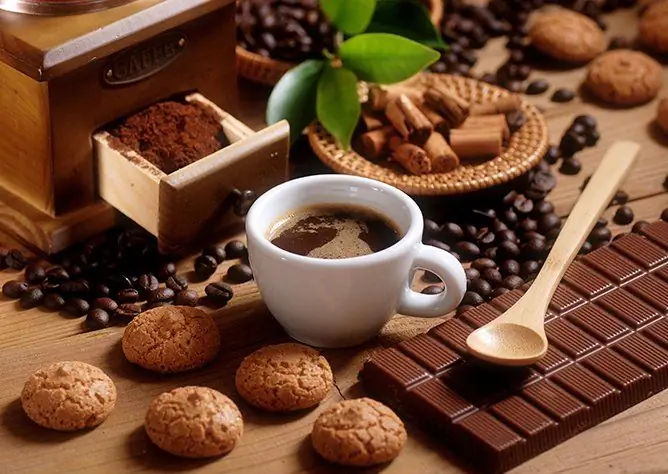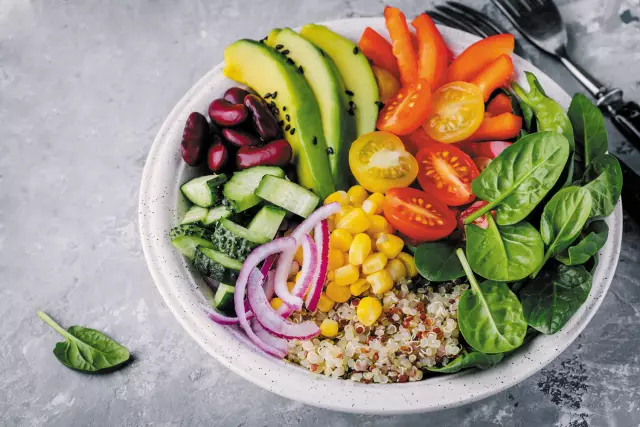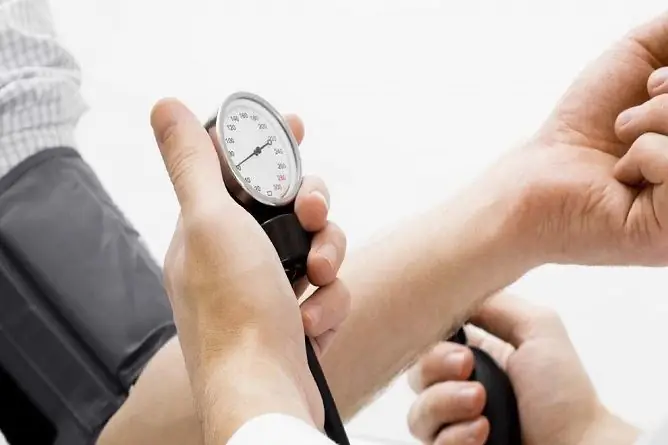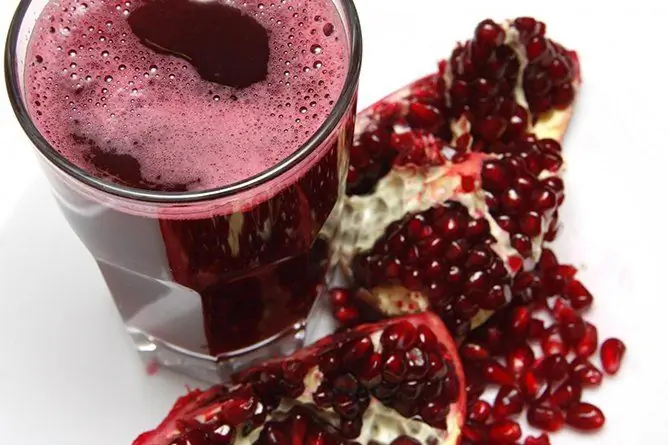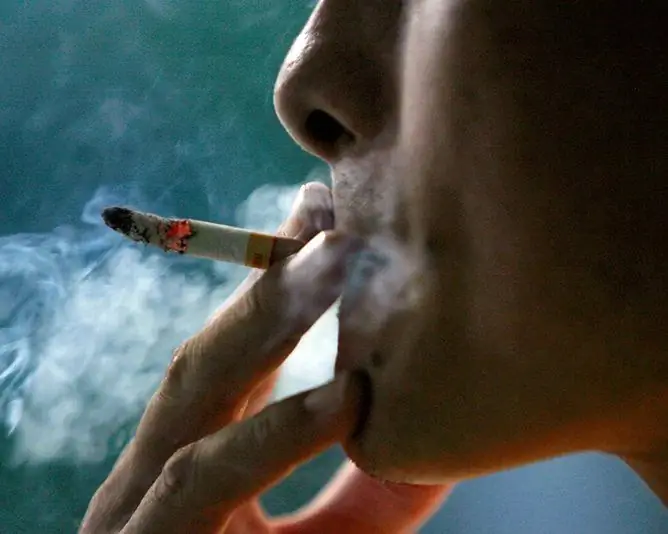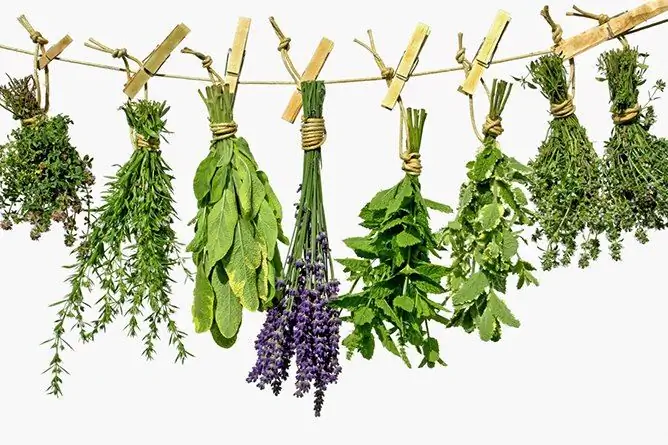- Author Rachel Wainwright wainwright@abchealthonline.com.
- Public 2023-12-15 07:39.
- Last modified 2025-11-02 20:14.
Foods that increase blood pressure: what foods increase blood pressure and are recommended for hypotension
The content of the article:
-
What foods increase blood pressure
- Caffeine-containing products
- Salt and spices
- Plants
- Hearty food
- Proper nutrition for hypotension
- Why is the pressure decreasing
- Video
Foods that increase blood pressure are recommended to be included in the diet for chronic hypotension - their wise use can help normalize blood pressure, especially in combination with other measures, for example, daily contrast showers and massage.

The most pronounced tonic effect is possessed by products containing caffeine.
Hypotension (low blood pressure) is a fairly common problem, it has a bad effect on well-being, and with a prolonged course or in an acute form, it has a serious negative effect on the body. It must be understood that any drop in pressure entails circulatory failure, due to which organs and systems that consume the most oxygen and nutrients - the brain, kidneys, liver, heart - suffer. Hypotension is accompanied by a deterioration in the functioning of the brain precisely because of its oxygen starvation. A person whose blood pressure has decreased, experiences weakness, headache, his ability to work decreases, and in severe cases he may experience vascular collapse. Acute hypotension requires urgent medical intervention, as it is associated with life-threatening conditions,and with chronically low blood pressure, non-drug methods of correction are recommended, in particular, diet therapy.
What foods increase blood pressure
Foods that increase blood pressure include foods containing caffeine, salt or spices, hearty osmotically active foods that are high in water and natural stimulants, berries and fruits.
Caffeine-containing products
The biological effect of caffeine is to directly stimulate the central nervous system, in particular, the respiratory and vasomotor centers in the medulla oblongata. The second controls the contraction of the smooth muscle structures of the veins, it is responsible for maintaining peripheral tone, both upper (systolic) and lower (diastolic) pressure depend on this. The respiratory center also affects the pressure, albeit indirectly, since the oxygenated blood stimulates the surrounding structures, tones them up.
The main caffeinated foods include coffee, tea, chocolate and cocoa. The effect of caffeine comes on rather quickly, it can be felt within a few minutes after drinking a cup of strong tea or coffee. This is its obvious advantage, which allows the use of caffeine in cases where hypotension needs to be stopped immediately. Tea, in addition to caffeine, contains other biogenic alkaloids that have a similar effect, for example, theine and theobromine, but other substances in its composition soften the effect of caffeine, so tea has a slightly less pronounced stimulating effect.
The caffeine content in different types of coffee or tea differs, it can be determined using special tables.

The caffeine content of the most popular tonic drinks
To enhance the tonic effect of tea or coffee without making the drinks too strong, you can complement them with a piece of chocolate bar or one or two chocolates.
However, it is not recommended to abuse caffeine, as it can lead to insomnia, increased excitability and hypertension, as well as other undesirable consequences. You should be especially careful with such products in old age due to the lost elasticity of the vascular wall and the increased risk for the cardiovascular system. In addition, excessive use of caffeine-containing stimulants leads to addiction and the development of tolerance, i.e., a decrease in the effect. Caffeine-containing drinks are recommended to be consumed only in adulthood, they are contraindicated for children (with the exception of weak tea).
Salt and spices
Table salt contains sodium ions, which play a critical role in the regulation of water-salt metabolism. Sodium is extremely active in relation to water - it attracts its molecules, retaining them in places where there are many such ions. The most active metabolism occurs in the kidneys, where, together with sodium, water is filtered and excreted from the body. Increased salt intake leads to an increase in sodium levels in the blood, which causes water retention in the bloodstream. A person loses less water through sweat and urine, and salt encourages him to drink more. All of this keeps blood pressure high.
The use of salt requires caution, since an excessive amount of it negatively affects not only the cardiovascular system, but also the condition of the kidneys and liver. To control the consumption of this product, it is recommended not to add salt to the water when the food is being prepared, but to add salt to the ready-made meals.
Salt does not increase pressure immediately, but over several days, so you should not expect a quick effect.
Hot and spicy spices have a similar effect - they increase motility and secretion of the digestive glands, retain fluid in the body.
What foods raise pressure? Black and red peppers, ginger, horseradish, mustard, as well as salted and pickled vegetables, salted fish, smoked meats.
Plants
The following plants have a beneficial effect on the cardiovascular system and maintain tone:
- lemongrass;
- ginseng;
- guarana;
- rhodiola rosea;
- eleutherococcus.
Preparations from them can be purchased at the pharmacy or prepared on their own, but just as with the use of caffeine, you should be careful and remember that abuse can lead to health complications.

The advantage of fruits, berries and juices from them is the pressure regulating effect
The consumption of tonic fruits and berries carries a significantly lower risk, it is a tasty and healthy way to normalize blood pressure and well-being. Because of the undeniable benefits, these products are recommended for low blood pressure in women during pregnancy.
Mildly stimulating the nervous system effect is possessed by:
- Garnet;
- dogwood;
- grapes;
- sea buckthorn;
- pear;
- dates;
- black currant;
- lemon.
A feature of fruits and berries is that they regulate blood pressure, that is, increase, if it is low, and lower high, so they can be used by both hypo- and hypertensive patients. In addition, they are perfectly combined with other hypertensive drugs - coffee with lemon, strong tea with currant or dogwood jam have a great effect on well-being.
Hearty food
By consuming high-calorie food, a person increases the total energy reserve of the body, which is spent on maintaining homeostasis, including pressure. Hypotonic patients need to eat meat and other protein products (sausages, milk, cheese, sour cream, eggs, etc.), since protein increases the viscosity of the blood and thereby increases blood pressure. It should be remembered that excessively viscous blood adversely affects the cardiovascular system, in order to prevent this, protein products should be consumed, observing the drinking regime.
A great way to quickly build up blood pressure is with a mug of sweet tea and a butter and cheese sandwich, or a handful of salted peanuts with grape juice.

Protein foods increase blood pressure
Proper nutrition for hypotension
The implementation of proper nutrition with hypotension allows you to control your blood pressure at home without the help of drugs. Attention should be paid not only to foods that increase blood pressure, but also to other parameters of food (food intake, quantity and quality), as well as the amount of liquid consumed per day. Meals should be nutritious and cover the body's needs in terms of quality (in fats, proteins, carbohydrates) and quantitative (in kilocalories). You should eat regularly, adhering to the regime - at least three, and preferably 4-5 meals a day, at approximately equal intervals.
Low blood pressure is often associated with inadequate fluid intake, so you should drink at least four glasses of water daily. It is important to remember that many tonic drinks, such as coffee, increase the flow of urine. So, a cup of coffee you drink helps to remove from the body more than a cup of liquid. Therefore, using them, it is necessary to maintain water balance by drinking more water than usual.
Why is the pressure decreasing
Blood pressure is maintained by several systems. First of all, it is the heart, kidneys (they are also responsible for vascular tone), the endocrine system. Low blood pressure can be caused by a disturbance from these organs and systems.
Pressure can drop due to physical exertion, dehydration, bleeding, with allergic reactions and shock conditions, as well as with a drop in the activity of the nervous system after emotional stress, with chronic fatigue, exhaustion. Especially often low blood pressure worries women, in particular during pregnancy, which is associated with hormonal changes.
Video
We offer for viewing a video on the topic of the article.

Nikita Gaidukov About the author
Education: 4th year student of the Faculty of Medicine No. 1, specializing in General Medicine, Vinnitsa National Medical University. N. I. Pirogov.
Work experience: Nurse of the cardiology department of the Tyachiv Regional Hospital No. 1, geneticist / molecular biologist in the Polymerase Chain Reaction Laboratory at VNMU named after N. I. Pirogov.
Found a mistake in the text? Select it and press Ctrl + Enter.

